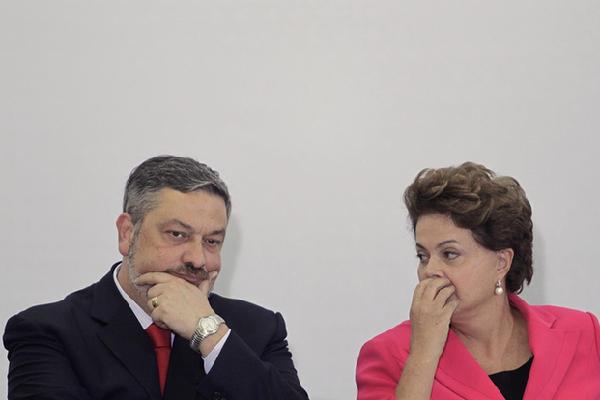Newsmakers
Resignation of Brazil's Palocci leaves a void
(Agencies)
Updated: 2011-06-08 15:35
 |
Large Medium Small |
BRASILIA - The resignation of President Dilma Rousseff's top aide is unlikely to cause major upheaval in Brazilian financial markets on Wednesday, but it could lead to more government spending and a generally less market-friendly approach in months to come.
Antonio Palocci, considered an anchor of fiscal discipline and rigorous inflation control, quit as chief of staff late on Tuesday after a drawn-out scandal over his sudden enrichment and acquisition of a multimillion-dollar home.
 |
|
Brazil President Dilma Rousseff (R) talks with former Chief of Staff Antonio Palocci during a signing ceremony of agreements for the construction and improvement of schools at the Planalto Palace in Brasilia, May 26, 2011. The most powerful pro-business voice in Brazil's government resigned on June 7, 2011, following a scandal over his sudden enrichment, prompting worries on Wall Street that his departure could herald a leftward drift in economic policy. [Photo/Agencies] |
Most investors don't expect any immediate or abrupt changes to the stable, slightly left-of-center policies that have made Brazil's economy one of the world's brightest stars.
Yet over the longer term, Rousseff's government will likely suffer from the loss of its most prominent ambassador to foreign investors. Palocci was a champion of economic reforms such as a streamlining of the tax code that many believe are crucial to ensuring continued strong growth this decade as Brazil prepares to host the World Cup and Olympics.
|
||||
However, the bank added that market reaction would likely be restrained, with possibly some light selling of Brazil's bonds and currency, since there were "no immediate (economic) implications" from Palocci's departure.
During nearly a decade in power, Workers' Party governments including Rousseff's have repeatedly defied predictions of a shift to the left and guided Brazil to robust economic growth of 4 to 5 percent a year.
"The financial market learned that the economic policy has a foundation," said Roberto Padovani, chief strategist with WestLB in Sao Paulo.
Indeed, Palocci's resignation could mean some short-term relief for Rousseff. Daily headlines over the scandal have distracted her from tackling economic challenges such as stubborn inflation and an overvalued currency that is fueling an import boom and angering some local industries.
Markets may end up paying more attention on Wednesday to Brazil's central bank, which is expected to raise its benchmark Selic rate by 25 basis points after market close to 12.25 percent to try and slow the pace of rising prices.
Calm before Another Storm?
It's the longer term where Palocci's absence will be most acutely felt.
The 50-year-old former Trotskyite and trained doctor was easily the most powerful official in Rousseff's government, fellow ministers said. He constantly represented the private sector's interests in high-level meetings, pushing $30 billion in tough budget cuts earlier this year and other steps that would help keep prices down.
With him gone, the balance of power in Rousseff's cabinet is likely to gradually tilt to the left, prompting a heavier government hand in the economy.
"There's a bit of a vacuum surrounding economic policy-making now. Palocci was a key player," said Alexandre Barros, a Brasilia-based political consultant.
In recent months opposing sides in Rousseff's cabinet have played tug-of-war over whether to ease land purchases by foreigners, raise royalties in mining, and partially privatize airports.
Rousseff opponents in Congress may also sense an opportunity in Palocci's demise to further attack a weakened government.
Rousseff, herself a career technocrat with little political experience, will find it even more difficult to hold together her broad coalition and keep often unruly allies at bay.
Palocci's replacement, a legislator from the ruling Workers' Party, is a mirror image of Rousseff, with a long track-record as a civil servant but only six months of political experience as a senator.
"Dilma has no political operator to hold her coalition together, to fend off power-hungry allies," said Jose Luciano Dias, analyst with CAC political consultancy in Brasilia.
"This crisis is not over."
| 分享按鈕 |


